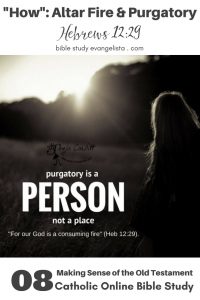Episodes

Monday May 28, 2018
Bible Study Evangelista - ”How”: Altar Fire & Purgatory
Monday May 28, 2018
Monday May 28, 2018
Notes and References
“For our God is a consuming fire” (Heb. 12:29).
Fire in the OT:
- Genesis 15:1-17 God calls Moses from the burning bush
- Exodus 3:1-8 God leads from the pillar of cloud and fire
- Exodus 12:8-10 God descends on Mt. Sinai in a fire
- Exodus 13:17-21 God and Abraham make a covenant
- Exodus 19:18-19 the Passover lamb must be roasted and eaten
Leviticus 9:22-24, And fire came forth from before the LORD and consumed the burnt offering and the fat upon the altar.
Leviticus 6:9-13 it is stressed three times that the altar fire, once lit, must burn continuously, because every sacrifice offered in the tabernacle from this time forward was to be incinerated in the fire that originated from God’s presence.
In early Judaism, criminals whose crimes were hanging offenses were said to be cursed by God (Deut. 21:22-23).
Luke 9:23-24, And he said to all, “If any man would come after me, let him deny himself and take up his cross daily and follow me. For whoever would save his life will lose it; and whoever loses his life for my sake, he will save it.”
Peter 4:12-14, When you experience suffering voluntarily (like OT freewill offerings) “the spirit of glory and of God rests upon you.”
1 Peter 1:6-7, Fire purifies metals of the impurities that make it weaker, less valuable, and less reliable.
1 Peter 4:12, We suffer “fiery trials” to purify our faith.
Sirach 2:1-6, “Fiery trials,” especially the sufferings and humiliations suffered by those who “serve the Lord,” can cleanse us from sin and passions and purify us of the inclination to sin.
Exodus 34:14, It is the holy, jealous love of God, Himself, that purifies us.
“Either in this life or in the life to come, the soul that seeks union with God must be purged by ‘The fiery Love of God.’ The holy souls are purged of all the rust and stains of sin which they have not rid themselves in this life. The fire of purgatory is first of all The Fiery Love of God” (St. Catherine of Genoa).
1 Corinthians 3:9-17, For we are God’s fellow workers; you are God’s field, God’s building. According to the grace of God given to me, like a skilled master builder I laid a foundation, and another man is building upon it. Let each man take care how he builds upon it. For no other foundation can any one lay than that which is laid, which is Jesus Christ. Now if any one builds on the foundation with gold, silver, precious stones, wood, hay, straw– each man’s work will become manifest; for the Day will disclose it, because it will be revealed with fire, and the fire will test what sort of work each one has done. If the work which any man has built on the foundation survives, he will receive a reward. If any man’s work is burned up, he will suffer loss, though he himself will be saved, but only as through fire.
St. Faustina: “I asked these souls what their greatest suffering was. They answered me in one voice that their greatest torment was longing for God.”
Pope Benedict the XVI, teaching on the mystics, said that rather than a “place” in the depths of the earth with an exterior fire, they saw purgatory as an interior fire. They understood purgatory to be the soul’s experience and awareness of God’s immense love and perfect justice. The soul suffers for not having responded appropriately to the perfect love it “sees” and experiences. This suffering is just, and is the simple, natural consequence of habitual separation of one’s will from love. It is precisely the love of God Himself which purifies the soul from the ravages of sin (General Audience, 1.12.11).
“The Church gives the name Purgatory to this final purification of the elect*, which is entirely different from the punishment of the damned… The tradition of the Church, by reference to certain texts of Scripture, speaks of a cleansing fire.
“As for certain lesser faults, we must believe that, before the Final Judgment, there is a purifying fire. He who is truth says that whoever utters blasphemy against the Holy Spirit will be pardoned neither in this age nor in the age to come. From this sentence we understand that certain offenses can be forgiven in this age, but certain others in the age to come” (CCC 1030-1031).



Comments (0)
To leave or reply to comments, please download free Podbean or
No Comments
To leave or reply to comments,
please download free Podbean App.